This is not a pipe
Well blow me down!
I just realized that it was Sunday—and that my review of the first installment in Fantagraphics' Popeye reprint project is now up at the Los Angeles Times site.
Well blow me down!


Love this image from Jordan Davis's Equanimity:

The challenge is as always to detect whether habits are recorded because they are normal or exceptional.

Born in Flames seems to have sprung from the pen of someone who walked out of the apocalyptic ending of Nathanael West's The Day of the Locust. While by no means parochial, his is a vision deeply grounded in Southern California, resting on a worldview shaped by violence, unkept promises, and a cornucopia of images, spectacle, and pop commodities. Hampton is a polymath and cultural omnivore, and what emerges from the pages of this dizzying and dazzling collection is an example of what important criticism is and can be: critical intervention not only into the meanings of individual genres and oeuvres but into our culture generally.
--David Suisman, Assistant Professor of History, University of Delaware
1. Want to read more about Rivette's Out 1? Here's John Ashbery's 1974 take on the shorter version (Out One: Spectre), from the SoHo News.
The book is, I think, supposed to be a sci-fi send-up of the standard diplomacy potboiler, as competing teams of government agents search for a rare breed of sheep — a crucial element for an alien coronation ceremony — with the fate of the earth hanging in the balance.
1. From Ned Beauman's blog at The Guardian:
A study by Ohio State University has found that our enjoyment of detective stories depends on our self-esteem. Specifically, the less confident we are, the better we like it when the murderer is revealed to have been exactly whom we suspected all along, and vice versa. The researchers suggest that guessing correctly is a "little self-esteem boost", which to some of us is very precious.
LDr. Wilson reported that after running a maze, rats would replay their route during idle moments, as if to consolidate the memory, although the replay, surprisingly, was in reverse order of travel. These fast rewinds lasted a small fraction of the actual time spent on the journey.
Labels: labyrinths
In the Times this morning:
President Bush praised Mr. Ford for his contributions to the nation “in an hour of national turmoil and vision,” in a statement released early today from his ranch in Texas.
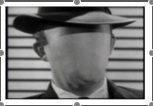
More on the closings of Ivy's/Murder Ink (definitely read this—it's by owner Jay Pearsall) and La Rosita.
Christmas soundtrack, via Dizzyhead Hua's Palace: "The Christmas Rock," by Sherman and Pretty Tony, with Calvin Mills II.
At Slate, Zoilus blogger Carl Wilson writes eloquently on Destroyer and newish Canadian fave Final Fantasy.
...this one by the inimitable Luc Sante. Alas—another piece I'm not going to read in full, since I still want to read Against the Day and am very spoiler-sensitive (e.g., even the relating of a small joke or bit of wordplay can seem too much, like you're being robbed of some future pleasure).
The menschy Jeff Yang (is he a Dizzyhead?) has a good rundown of the year in Asian Americana. Dig his seasonal play on the recent Survivor winner's name!
Still in gay pinstripe clown-style pajamas, Joe Chip hazily seated himself at his kitchen table, lit a cigarette and, after inserting a dime, twiddled the dial of his recently rented 'pape machine.
Labels: Harry Stephen Keeler, Philip K. Dick
This meme (right word? No) is everywhere: Syntax of Things' "Underrated Writers 2006." Lots of interesting stuff here—Joshua Clover and Paul LaFarge get props, and I spot some Dizzyheads among the contributors...
From the new Royal Books catalogue:
Portis, Charles. The Dog of the South (First Edition, Inscribed by Eudora Welty). NY: Knopf, 1979. First Edition. Hardcover. First Edition, Fine in a Fine dust jacket. SIGNED and inscribed by Eudora Welty to two friends, thus: "For --- and --- / with love / and with my thanks for so much, / Eudora / Chicago, April 17, 1980." A very nice secondary association, and an interesting connection between two important southern authors of different generations.
[Book #80736] Price: $650.00
From the Sylvester Stallone Q&A:
What do you consider your worst film? Rhinestone or Stop Or My Mom Will Shoot?
—Eric P.
The worst film I’ve ever made by far… maybe one of the worst films in the entire solar system, including alien productions we’ve never seen… a flatworm could write a better script then STOP! OR MY MOM WILL SHOOT. In some countries – China, I believe – running STOP! OR MY MOM WILL SHOOT once a week on government television has lowered the birth rate to zero. If they ran it twice a week, I believe in twenty years China would be extinct. Does that put it in perspective, Eric P.?
And—tremendous sigh—speaking of New York ghosts...
The genteel Ivy's Books and Curiosities mingles new and used titles on the same shelves in healthy heterogeneity. When you realize that your friends don't read anymore, get them the variations on the classic theme book, the mottled covers decorated with pages from casting books or reproductions of Spanish movie posters. Other stocking stuffers include paper model kits, flip books, and slim, vintage recipe books from the '50s and '60s. Isn't it time your roommate relearned The ABC of Chafing Dish Cookery?
(PARK)

"What kind of tale can possibly evolve from such a gallimaufry of trivia? A dreamer on a park bench, a dim-witted bird fancier, a dead cat, an eight-year-old boy, a picture dealer, a handful of pigeons and an insurance agent—hardly the cast of War and Peace, I must agree." So speaks the witty but slightly (?) deranged narrator, park-bench dreamer, master painter and hero (?) of this fantastical and compelling first novel. The unlikely tale that does evolve draws the unwitting narrator into a plot to palm off one of his works as a Leonardo da Vinci. Somewhat later he proceeds to poison no fewer than seven people in a visionary effort to meet and kill God.

An old article that I found via this blog's Site Meter: "Anthony Powell as Clubman," from a 2000 Spectator.
The inimitable Carla has a fascinating piece on Robert Lowell at Yaddo up at the Poetry Foundation website.
Dizzyhead Brandon alerts us to Paper Thin Walls, a newish music site featuring plenty of great (and free! we're very into free these days) downloads. Right now they're asking various music writers for their summing-up song of the year—it's fun!
Dizzyhead L. Lee Lowe informs us that the first audio installment of her YA novel Mortal Ghost—an online project—is now available. (We're between plug-ins right now, but hope to listen soon...)
Oh, Rosie!
In related news: Am I the only one who raised an eyebrow when Sarah Silverman was interviewed by the Times in the wake of the Michael Richards racist-tirade flap, and wasn't asked about her own controversial race-baiting joke (the infamous "I hate ch--ks"*) and escalating/incensing non-apologies)? (In the piece, she's reminded only of Mel Gibson's drunken rant.)
"To say 'ching chong' to someone is very offensive, and some Asian people have told me it's as bad as the n-word. Which I was like, 'Really? I didn't know that.'"
Does everyone know about Featherproof Books, little downloadable books that you print out and fold into shape? (Sound familiar?) They are truly "light reading" —
Couldn't resist! Here's British fantasist Michael Moorcock (creator of, among other things, the Elric of Melniboné novels) on Against the Day:
Gloriously, demandingly, daringly Pynchon has rediscovered vulgarity and continues to prove that the novel has never been more vibrant, more various or better able to represent our complex world. Give this book your time. I think you’ll agree it’s worth it.
No new posts for a while—unless someone on Team Dizzies would like to take up the torch?!—but for the nonce you can subscribe to The New-York Ghost, called "the deeply pleasing mystery rag" by Jane Dark's Sugar High!
We all have stories like that, stories we rely on to establish our charm in the begining of relationships. I tell one about wanting to play the ukulele in the school orchestra. They asked me what instrument I wanted to play, and I said the ukulele, and they said, but there's no ukulele in the school orchestra, and I said, then what can I play that's like the ukulele, and they said the viola. That story doesn't sound so charming on the page, but I tell it very well.
—Nora Ephron, Heartburn
[Bud] Sagendorf had been a resident of Santa Monica since age 3, living with his widowed mother and older sister. The mother had moved there from Washington state after her husband died. She opened a beauty shop. Sagendorf's sister worked at a stationery store and guess where Segar bought his supplies? When she told [E.C.] Segar [creator of Popeye] of her brother's interest in cartooning, Segar invited him over to the house. Soon he hired Sagendorf as his assistant doing lettering and backgrounds. He asked Sagendorf only two questions before he was hired: Did he like fishing, and what type of books did he read? Sagendorf's answer to the first question was yes and 'science fiction' to the latter, and Segar enjoyed both—probably the fastest job interview in history. (Segar had already seen the young man's drawings, so he knew he could draw). —Ed Black's Cartoon Flashback
Labels: E.C. Segar, job interview, Popeye
Over at Manhattan User's Guide, Charlie Suisman shares a fond look back at the original Dreamgirls. (I love these before-they-were-famous tidbits.)
The Boston tryout is the period I remember with the most pleasure. Despite tech week's '10 out of 12s' – a grueling schedule of ten-hour rehearsals out of a period of twelve hours, the shared purpose, being out of New York, and the excitement over the show created a camaraderie among the cast, crew, designers, and everyone else working on the show. (Well, among most of us: Phylicia Ayers-Allen, who was in the chorus, had a permanently aggrieved look on her face and her demeanor made it clear that she was made for better things. And who's to say she wasn't right, since she went on to become Phylicia Rashad and to play Bill Cosby's wife on The Cosby Show.)
I'm piggybacking off of Termite Artist/Dizzyhead Matt's post on Sylvester Stallone. At Ain't It Cool—a site I rarely (ever??) visit—he's answering round after round of questions.
Sly-In "Remembering Charlie," Jerry Epstein's book on Charlie Chaplin, you are mentioned quite extensively. In fact "Rocky" was one of the last films Charlie ever saw. In the book Mr. Epstein says you were never able to comment on your appreciation for Chaplin's films, although he says you were a huge fan and had hoped to "have an audience with the great maestro." Could you tell us a bit about your relationship with Charlie and the effect he had on your career?
Eric Paul Erickson
Chicago, IL
I was scheduled to see Charlie Chaplin, but I froze myself out of that by, believe it or not, being too nervous, like I did when I was suppose to meet Elvis. I love Charlie Chaplin. I borrowed the hat idea from Charlie Chaplin and always pictured (in a urban, concrete, trashy way) that Rocky was the slight embodiment of The Little Tramp.
Things I left out of my roundup—other categories for 2006 favorites:
Park Lit/Housing Works maven Rachel F. proposes a good challenge. She's asking people to contribute to Smith storytelling magazine's search for the best six-word memoir!
[For those of you joining from the National Book Critics Circle blog—welcome! For those of you starting here, take a look over there for my top pick...]
i. Popular misspellings: Dizzyhead Brent points to Lindsay Lohan's heartfelt thoughts on the late Robert Altman (who directed her in this year's A Prairie Home Companion). It ends:
Thank You,"BE ADEQUITE"
Lindsay Lohan
I just saw that Gawker is jumping on L.L. for this. But perhaps she meant to spell it that way—a sort of portmanteau meaning "quite adequate." She's telling us to be "just good enough, thank you." Not a bad policy.
In other solecism news: the Thomas Pynchon letter (below) in defense of Ian McEwan (which we initially misspelled as "McEwen," unconsciously giving props to the great novelist in exile, Todd McEwen) contains a small goof as well:
Memoirs of the Blitz have borne indispensible [sic] witness, and helped later generations know something of the tragedy and heroism of those days.In this case, tripling the "i" makes us conscious of the authorial ego (not Pynchon's per se, but the general notion of an authorial ego). The fact that it's lowercase simultaneously emphasizes the lack of ego vis-à-vis the issue of I.McE's purported plagiarism: We don't necessarily need to use our own words, it is all grist for the mill, literature is one long conversation with the dead, there is no single author, etc.


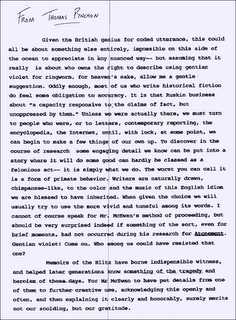
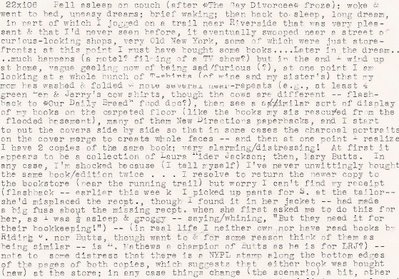
1. I was reading Slate this morning, and bristled at this (in a review by Caroline Moorhead):
But I think it's a great title! I don't know if this was intentional, but there's something Gertrude Stein-y about it, and the whole idea of an autobiography written by someone else is also of course GS-y. And the cover seems excellent to me—not just the image, but the cover's textbook feel, which triggers a tactile memory of school days (i.e., the period of childhood taken by Deng).
"Written as a series of alternating sections or flashbacks, What Is the What—bad title, terrible cover—calls itself a novel but was created closely out of the story told to Eggers by Valentino Achak Deng, who reached Atlanta, after 14 years in refugee camps, in 2001."
I occasionally live under the illusion that people visit The Dizzies to read my lighter-than-air musings on literature, cinema, comics, and ukeleles. The truth of the matter is that most visitors hone in on this hapless URL because they've searched for talking cats, voice of the Buffalo Sabres Rick Jeanerette, or news about Dennis Lim.

A compendium of alternative film reviews from the past 50 years edited by New York's peerless critic Dennis Lim. V------ V---- Film Guide £9.99, John Wiley
In Vienna, he met Ceil Chaiken, a survivor of the ghetto in Kovno, Lithuania; they were married in 1946. Three years later, the family came to the United States, where Mr. Welles adopted his new name. (He based his first name on his Hebrew name, Eliyahu. His original surname, Sauerquell, is German for “mineral wells” — hence Welles; he chose the spelling as an homage to Orson Welles, his son said.)
—from Margalit Fox's NYT obit for Elliot Welles, "indefatigable Nazi hunter"
1. Yalies! Ye sons—and daughters—of Eli! Tomorrow night (Monday, 12/4), go hear Believer goddess Heidi Julavits read from her ace new novel, The Uses of Enchantment. She'll be appearing with Chris Adrian, author of (the excellent-seeming, though I've only had a chance to read the first chapter) The Children's Hospital, at St. Anthony Hall at the corner of Wall and College Streets. It's at 7:30, it's free, and it's refreshment-enhanced!

1. A fine panel yesterday at the Small Book Fair—John Cotrona, T Cooper, and Peter Plate discussed various issues pertaining to indie-press fiction, and then answered a number of questions from the audience . . . some of which were decidedly off topic. It didn't matter, in the end, as all three were able to spin their answers into something interesting and useful. I'm now a big fan of T's Lipshitz Six, or Two Angry Blondes—here's what I wrote in my intro:
As the title suggests, two books battle between these covers, and sometimes it seems like three times that many. It’s an ambitious, at times delirious mash-up of Charles Lindbergh, Eminem, pre-James Frey truthiness, rampant identity shapeshifting, a straight-ahead (and heartbreaking) immigration narrative, and an intergenerational grief epic to boot. It gives post-, or post-post, modernism a very good name indeed.
His latest novel is the taut, post-prison blues Soon the Rest Will Fall, about an unconventional romantic triangle, recidivist impulses, and hunting in the wilds of San Francisco. In lean, urgent chapters, his electric prose unfolds to a jazz and soul soundtrack, leading up to the most jaw-dropping courtroom scene you’ll read this year.
Russell H. Greenan was born and educated in New York, where he worked briefly at banking before enlisting in the Navy. After war service and graduation from Long Island University, he sold indiustrial gas, diesel engines, and ball bearings, while continuing to read voraciously about art and the art world, always his major interest. Twice he saved enough money to quite his job and go to Europe, the last time with his family. It was in Nice, France, where they settled for a fifteen-month period, that his first novel was written. His favorite modern authors include Cellini, Nathanael West, and J.P. Donleavy, but his talent is uniquely his own.
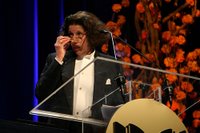
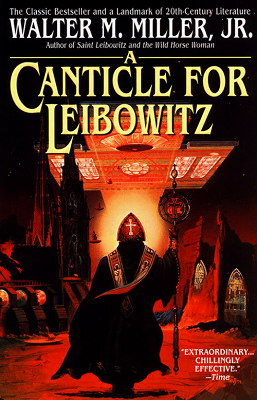
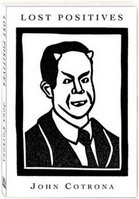

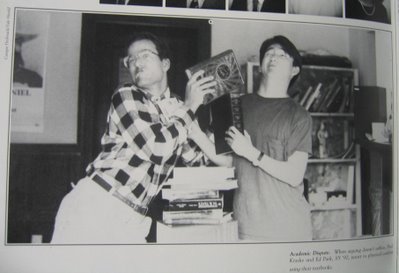
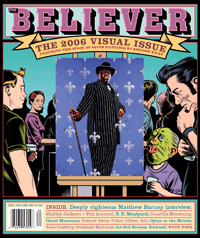
By now—week's end!—it's old news that Philip K. Dick will be given the Library of America treatment, à la earlier pulp divinity H.P. Lovecraft, and that PKD champion/sage Jonathan Lethem will edit and write the endnotes. Good news!
The writer spins the rack. It’s all his old stuff, as though it had been sitting there for twenty years. Death of an Anti-Watcher. We Can Wrap It For You To Go. The Variable Feasibility of Perkus Tooth. Celestial Crap-Assessor.